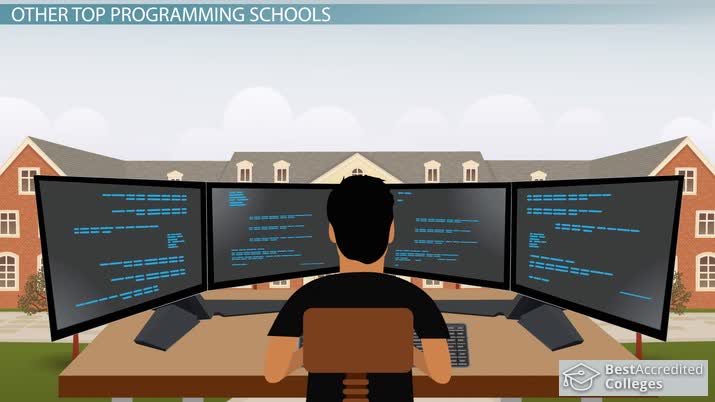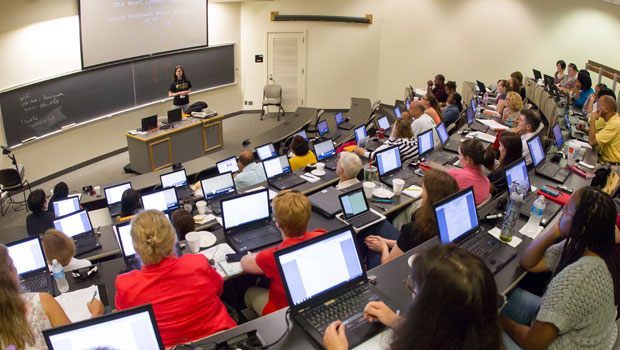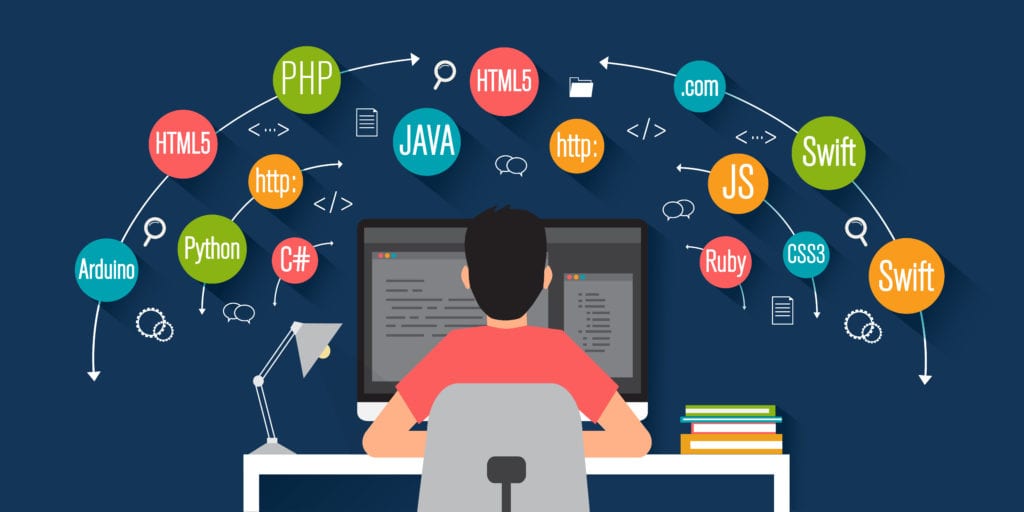In the past, a computer programming degree often meant a career in software development. Today, the field has diversified, with specialized concentrations in areas like cybersecurity, data science, and mobile development. Choosing the right computer programming school means selecting a program that aligns with your specific career goals and interests. This guide will provide you with an in-depth look at the best computer programming schools, helping you navigate your educational journey in this lucrative field.
Toc
- 1. The Importance of a Computer Programming Degree
- 2. Exploring Different Types of Computer Programming Programs
- 3. Choosing the Right Computer Programming School for You
- 4. Top-Ranked Best Computer Programming Schools
- 5. Related articles:
- 6. Essential Skills for Success in Computer Programming
- 7. Frequently Asked Questions
- 8. Conclusion
The Importance of a Computer Programming Degree

The demand for skilled programmers is rapidly increasing, with the Bureau of Labor Statistics reporting a median annual salary of around $93,000 for computer programming professionals in the United States. The U.S. Bureau of Labor Statistics projects a 13% growth in computer and information technology occupations from 2020 to 2030, much faster than the average for all occupations. With industries ranging from software development to web design and data analysis, the versatility of a computer programming degree cannot be overstated.
In addition to lucrative career opportunities, a degree in computer programming equips you with essential skills such as problem-solving, analytical thinking, and logical reasoning. These transferable skills are highly sought after by employers and are crucial for adapting to the ever-evolving tech landscape.
Exploring Different Types of Computer Programming Programs

When considering the best computer programming schools, it’s essential to understand the various types of programs available:
Associate Degrees
Typically completed in two years, associate degrees focus on foundational programming skills. For example, an Associate of Science in Computer Programming might focus on fundamental programming concepts, web development, and database management. They provide a solid introduction to essential programming concepts and languages, making them a suitable option for those looking to enter the job market quickly.
Bachelor’s Degrees
A bachelor’s degree offers a more comprehensive education, covering advanced topics such as data structures, algorithms, and software engineering. This four-year program is often seen as the standard for many entry-level programming positions and is highly regarded by employers. For instance, a Bachelor of Science in Computer Science might delve into these advanced topics, preparing students for a wide range of programming careers.
Master’s Degrees
For those seeking to specialize further or advance their careers, many institutions offer master’s degrees in computer programming. These programs often include concentrations in areas like cybersecurity, machine learning, or software development, equipping graduates with advanced skills and knowledge. The growing prevalence of cyberattacks and data breaches has led to a surge in demand for cybersecurity professionals, and many computer programming schools now offer specialized cybersecurity programs. Similarly, the rapid advancement of AI is transforming various industries, creating a high demand for programmers with expertise in machine learning, deep learning, and natural language processing. Many computer programming schools are integrating AI-related courses and research into their curricula, preparing students for this evolving field.
Online Programs
The rise of online education has made computer programming more accessible than ever. Online programs provide flexibility for students who prefer to learn at their own pace or cannot relocate for traditional schooling. While these programs can be more affordable, it’s crucial to ensure they offer hands-on experience and strong industry connections. However, some argue that online programs may lack the hands-on experience and networking opportunities provided by traditional campus-based programs.
Each program type has its pros and cons, including time commitment, cost, and potential career outcomes. Consider your own situation and career aspirations when selecting the right program for you.
Choosing the Right Computer Programming School for You

Selecting the best computer programming school involves personalized decision-making based on your unique needs and aspirations. Here are several factors to consider:
Programming Interests
Identify the specific areas of programming that excite you. Whether it’s game development, data science, or cybersecurity, choosing a school that offers specialized tracks can enhance your education and job prospects. For instance, if you are interested in game development, you might consider schools known for their game design programs or strong industry connections with game development studios.
Learning Environment
Consider your preferred learning environment. Do you thrive in bustling urban campuses, prefer the tranquility of suburban settings, or seek the convenience of online programs? The environment can significantly impact your educational experience.
Budget Considerations
Tuition costs and living expenses are vital factors in your decision. Research financial aid options, scholarships, and potential job opportunities on campus to help offset costs.
Faculty and Industry Connections
Evaluate the faculty expertise and industry connections of each program. Programs with experienced instructors and strong ties to the tech industry can provide invaluable networking opportunities and insights into the job market.
Hands-On Learning Opportunities
Look for programs that emphasize practical experience, such as internships and co-op placements. These opportunities can provide you with real-world experience, making you more competitive in the job market upon graduation.
While rankings can provide a general overview, they should not be the sole factor in your decision. Consider the program’s specific specializations, faculty expertise, and career support services to determine the best fit for your individual needs.
Top-Ranked Best Computer Programming Schools

After extensive research and analysis, here are some of the best colleges for computer programming in the United States, known for their quality programs and positive student outcomes:
1- Carnegie Mellon University (Pittsburgh, PA)
Carnegie Mellon is consistently recognized as one of the best computer programming schools, particularly noted for its interdisciplinary research and strong focus on information technology. Its graduate programs, including the MS in Information Security Policy and Management, are highly esteemed.
2- Massachusetts Institute of Technology (Cambridge, MA)
MIT is home to the renowned Computer Science and Artificial Intelligence Laboratory (CSAIL). The institution offers a Bachelor of Science in Computer Science and Engineering, along with advanced degrees such as the Master of Science in Electrical Engineering and Computer Science.
3- University of California, Berkeley (Berkeley, CA)
UC Berkeley’s Department of Electrical Engineering and Computer Sciences is frequently ranked among the top in the nation. The university offers a variety of degrees, including a Bachelor of Arts in Computer Science and a Master of Engineering in Computer Science.
4- Georgia Institute of Technology (Atlanta, GA)
Georgia Tech boasts one of the leading computer science programs in the country. Students can pursue degrees like the Bachelor of Science in Computer Science and the Master of Science in Computer Science, with numerous specializations available.
5- Stanford University (Stanford, CA)
Stanford’s School of Engineering is well-regarded for its pioneering contributions to computer science. Undergraduates can earn a Bachelor of Science in Computer Science, while graduate students can pursue advanced degrees such as the Master of Science in Computer Science.
These institutions represent just a fraction of the best computer coding schools available. While rankings can provide useful insights, consider other factors such as program specializations, campus culture, and career placement rates to ensure you find the best fit for your goals.
Essential Skills for Success in Computer Programming

Employers in the tech industry seek computer programmers with a diverse skill set beyond technical proficiency. Key skills include:
Problem-Solving
Problem-solving is at the heart of computer programming. Programmers must often break down complex issues into manageable parts, identify potential solutions, and implement the most effective ones. This involves not only understanding theoretical concepts but also applying critical and creative thinking to solve real-world problems efficiently.
Proficiency in Coding Languages
Employers look for candidates who are proficient in multiple coding languages. While languages such as Python, Java, C++, and JavaScript are commonly sought after, the specific requirements can vary depending on the job or industry. Being well-versed in several languages and understanding when and how to use them can make you a more versatile and desirable candidate.
Attention to Detail
In programming, small mistakes can lead to significant issues. A keen eye for detail ensures that code is written correctly and operates seamlessly. Thorough testing, debugging, and code review are crucial parts of the development process that highlight the importance of meticulous attention to detail.
Communication Skills
Effective communication is vital for collaborating with team members, understanding project requirements, and conveying technical concepts to non-technical stakeholders. Whether it’s through written documentation, code comments, or verbal discussions, strong communication skills can enhance project outcomes and team cohesion.
Time Management
Balancing deadlines and multiple projects requires excellent time management skills. Programmers need to prioritize tasks, set realistic timelines, and stay organized to ensure timely delivery of high-quality code. Effective time management can often differentiate exceptional programmers from their peers.
Adaptability and Continuous Learning
The field of technology is constantly evolving, with new tools, frameworks, and languages emerging regularly. A successful programmer remains adaptable and committed to continuous learning. Engaging in professional development opportunities, such as taking courses, attending workshops, and participating in coding communities, ensures that skills remain current and competitive.
By honing these essential skills, aspiring computer programmers can position themselves for success in a dynamic and ever-changing industry.
Frequently Asked Questions

What are some popular programming languages to learn?
Popular programming languages include Python, Java, C++, JavaScript, and Swift. Python is especially favored for its simplicity and versatility, making it an excellent choice for beginners as well as for applications in data science, web development, and automation. Java is widely used in enterprise environments and Android app development, while C++ remains crucial for systems programming and game development due to its performance capabilities. JavaScript is essential for front-end web development, allowing developers to create interactive web pages, and Swift is the go-to language for iOS app development. Ultimately, the best language to learn depends on your specific career goals and personal interests.
What are the best online resources for learning to code?
There are numerous platforms available, such as Codecademy, FreeCodeCamp, Coursera, and Udemy, that cater to a variety of learning styles and levels. Codecademy offers interactive lessons that make coding accessible and engaging, while FreeCodeCamp provides a hands-on, project-based approach to learning web development. Coursera partners with universities and organizations to offer more structured courses, often with the option to earn certificates, and Udemy hosts a vast array of courses on nearly every programming language and technology imaginable, allowing learners to pick and choose what suits their needs best.
What are the average salary expectations for computer programming graduates?
According to the U.S. Bureau of Labor Statistics, the median annual salary for computer programmers in the United States was $93,000 in May 2022. However, salaries can vary significantly based on factors such as experience, location, and the specific industry. For instance, entry-level positions may start at a lower salary, but with experience and specialization in high-demand areas like machine learning or cybersecurity, salaries can rise substantially, sometimes exceeding $120,000 or more annually.
What are the job prospects for computer programming graduates?
Job prospects for computer programming graduates are strong and continue to improve, reflecting the growing reliance on technology in every sector. A wide range of roles, from software development to web design and data analysis, are available across various industries, including healthcare, finance, and entertainment. The demand for skilled programmers is particularly high in emerging fields such as cybersecurity, where protecting sensitive information is crucial, and data science, which involves analyzing vast amounts of data to help organizations make informed decisions.
What are the best ways to prepare for a career in computer programming?
To prepare effectively for a career in computer programming, consider undertaking internships, coding boot camps, and online courses that focus on both foundational knowledge and practical experience. Internships provide real-world experience and the opportunity to learn from seasoned professionals, while coding boot camps can immerse you in intensive, fast-paced learning environments. Networking with industry professionals through meetups, conferences, or online platforms like LinkedIn can also be incredibly beneficial, as it can lead to mentorship opportunities, valuable insights, and potential job openings in the field. Engaging with communities, both online and offline, can enhance your learning and expand your professional network, making you more competitive in the job market.
Conclusion
In conclusion, selecting the best computer programming school is a critical step toward achieving your career aspirations in this dynamic field. By considering factors such as program specializations, campus culture, and career support, you can find a program that aligns with your personal and professional goals.
The benefits of a computer programming degree extend beyond financial rewards; they include the development of valuable skills that are in high demand across various industries. Start your research today, and take the first step toward a fulfilling career in computer programming by exploring the best colleges for computer programming that suit your needs.








